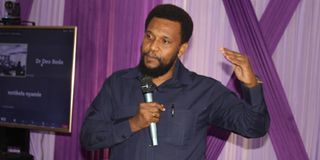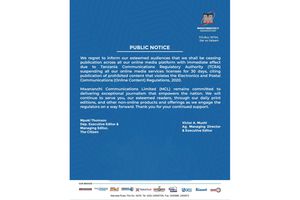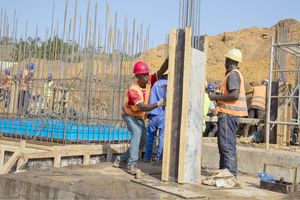800,000 people went for cancer screening in Dar and Mwanza, 30,000 tested positive

The Tanzania Comprehensive Cancer (TCCP) project manager from the Aga Khan Health Service Tanzania (AKHS,T), Dr Harrison Chuwa, speaks during the 'TCCP data dissemination workshop program’ held at the Bugando Medical Center (BMC) in Mwanza. PHOTO | MGONGO KAITIRA
What you need to know:
- The TCCP screened 800,000 people in Dar es Salaam and Mwanza, and found that 30,000 of them had cancer
Mwanza. At least 3.75 percent of people screened for cancer under the Tanzania Comprehensive Cancer Project (TCCP) were diagnosed with the disease, highlighting the need for increased awareness and early detection efforts.
The TCCP is a four-year project worth more than Sh39 billion that is jointly funded by the Agence Française de Développement (AFD) and the Aga Khan Health Service Tanzania (AKHS).
Speaking yesterday during the ‘TCCP data dissemination workshop programme’ at the Oncology Department of the Bugando Medical Centre (BMC), the TCCP project manager, Dr Harrison Chuwa, said a total of 800,000 people, residents of Dar es Salaam and Mwanza, were screened during the period.
Out of that number, 30,000 were diagnosed with various cancer types.
Notably, over 70 percent were diagnosed at the advanced stages of their disease, most of them being women diagnosed with cervical and breast cancers and men with prostate and colon cancers.
“Deployed in Tanzania’s two most populous regions (Dar es Salaam and Mwanza), TCCP’s goal was to improve the organisation and quality of care provided in the country through financial, technical, and material support, and so far we have managed to do so,” said Dr Chuwa.
He hinted that the programme was structured around four missions, including population outreach and early detection, strengthening technical and human resources, integrating the whole region in developing cancer treatment, and setting up evaluation and research facilities.
He pointed out that after beginning implementation of the project in September this year, the number of patients identified in the first and second stages of their disease has increased to 30 percent, while the goal is to reach over 45 percent by December 31, 2023.
According to him, despite the installation of a modern mammogram machine at Bugando Medical Centre (BMC), with a capacity of screening breast cancer for over 25 people per day, the machine has managed to screen 500 people each since its installation in 2020, that’s, a single person per day by average.
“I have been hesitant to present the report of the performance of the mammogram machine to the funders of this project due to the low number of people who have managed to be screened at Bugando. I urge you (Oncology HOD) to increase efforts by screening more people,” Dr Chuwa insisted.
Responding to the call made by Dr Chuwa, the Head of Department (oncology) at BMC, Dr Nestory Masalu mentioned low understanding of the cancer disease among the community members as an obstacle to reaching the number of people required to be screened for breast cancer by the mammogram machine available at the facility.
“There is only one mammography in the city of Mwanza for several million inhabitants. However, this single mammogram accounted for at least 1 or 2 mammograms per week at the beginning of our work. In other words, some days, no woman came to be tested, and this is due to the low exposure of people to medical testing,” said Dr Masalu.
“Due to the low response of people to attend cancer screening, we are embarking on creating awareness in the community. Taking an example at Bugando, we announced to conduct the screening, but unfortunately only 90 showed up. By doing so, we hope to see more people coming for cancer screening in Lake Zone,” he insisted.
Dr Masalu lauded that Bugando attends more than 1,500 new cancer patients per year, with 200 to 300 of them being children, equal to 20 percent, and 55 percent of them being women with cervical and breast cancer who arrive late at the hospital, which complicates their treatment.
Furthermore, Dr Masalu said that through the project, they have found that highly motivated patients who followed the training and treatment diligently improved their conditions.
According to data from the World Health Organisation’s (WHO) International Agency for Research on Cancer conducted in 2018, there are more than 40 000 new cases of cancer every year, most notably cervical, breast, prostate, and colon cancers.
However, only 30 percent of patients are treated in health care structures, and over 70% are diagnosed at advanced stages of the disease.
Cancer survivors
Speaking to The Citizen after the workshop, Ms Jeredina Nzongela called upon Bugando to extend its cancer treatment campaign to remote areas, noting that many of the victims and patients might be stuck around villages with no access to a cure.
“The situation is worse in rural areas; awareness about cancer has risen in urban areas compared to rural areas; thus, it is very important for the medics to extend their efforts towards rural areas and reach more people,” Ms Nzongela, a cancer survivor, said.
Meanwhile, Mr Deocles Rutatina urged the community to attend cancer screenings at least twice a year in order to keep in touch with their medical status.
The initiative has mobilised caretakers, social workers, politicians, regional administrations, patient associations, patients themselves, the media, and experts from medical institutions.





